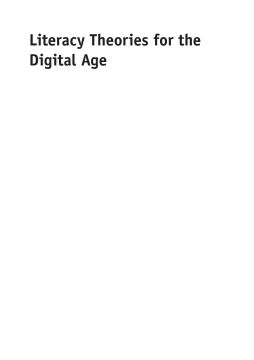
Additional Information
Book Details
Abstract
Winner of the 2017 Edward Fry Book Award from the Literacy Research Association.
Literacy Theories for the Digital Age insightfully brings together six essential approaches to literacy research and educational practice. The book provides powerful and accessible theories for readers, including Socio-cultural, Critical, Multimodal, Socio-spatial, Socio-material and Sensory Literacies. The brand new Sensory Literacies approach is an original and visionary contribution to the field, coupled with a provocative foreword from leading sensory anthropologist David Howes. This dynamic collection explores a legacy of literacy research while showing the relationships between each paradigm, highlighting their complementarity and distinctions. This highly relevant compendium will inspire researchers and teachers to explore new frontiers of thought and practice in times of diversity and technological change.
As literacy practices mutate in the digital era, research must evolve, and yet curricula still appear
to lag behind. Mills addresses her book to graduate students of education, so that they may gain a
vital introduction to some of the key theories that shape literacy education in the digital turn.
Sarah McMonagle, University of Hamburg, Germany
Digital and social media, multimedia, multimodality, and massive social and cultural changes in our global world are transforming what literacy is and how we ought to study it. Kathy Mills’ book is, by far and away, the best guide yet to this new world. It is the New 'New Literacy Studies'.
James Paul Gee, Arizona State University, USA
Kathy A. Mills is Associate Professor in the Faculty of Education at Queensland University of Technology, Australia. Kathy's research interests include literacy, digital media, education research paradigms, critical sociology, ethnography, classroom observation, discourse analysis, and multimodal analysis. She is Associate Editor of the Australian Educational Researcher and her previous works include The Multiliteracies Classroom (Multilingual Matters, 2011).
Literacy studies is moving on and Kathy Mills is helping us move forward, through new approaches, such as socio-spatial literacies, socio-material literacies, and sensory literacies. Many may be wary of all that technical language, but Mills signals her ability to make it comprehensible and leaves the reader with some control to, as the author says, take their own lines of flight. Enjoy the flight!
Brian V. Street, King’s College London, UK
Kathy A. Mills' work is truly impressive. The wealth of references contained within the volume makes certainly for a useful reading. But that is not the main asset of the book. What comes through as the strong point of Mills' work is that she has attempted to depict as large, comprehensive and complex a picture as possible of the multiple meanings that “literacy” may have in such a diverse global context as that of our planet in the 21st century.
Jose Ignacio Aguilar Río, Sorbonne Nouvelle-Paris 3 University, France
Table of Contents
| Section Title | Page | Action | Price |
|---|---|---|---|
| Contents | v | ||
| Figures | ix | ||
| Acknowledgements | xi | ||
| Foreword | xiii | ||
| Preface | xix | ||
| 1 Globalisation, Mobile Lives and Schooling in the Digital Turn | 1 | ||
| 2 Socio-cultural Literacies | 17 | ||
| 3 Critical Literacies | 41 | ||
| 4 Multimodal Literacies | 65 | ||
| 5 Socio-spatial Literacies | 91 | ||
| 6 Socio-material Literacies | 114 | ||
| 7 Sensory Literacies | 137 | ||
| References | 163 | ||
| Index | 192 |
